'Teach our history': What Akron students are learning in new AP African American Studies
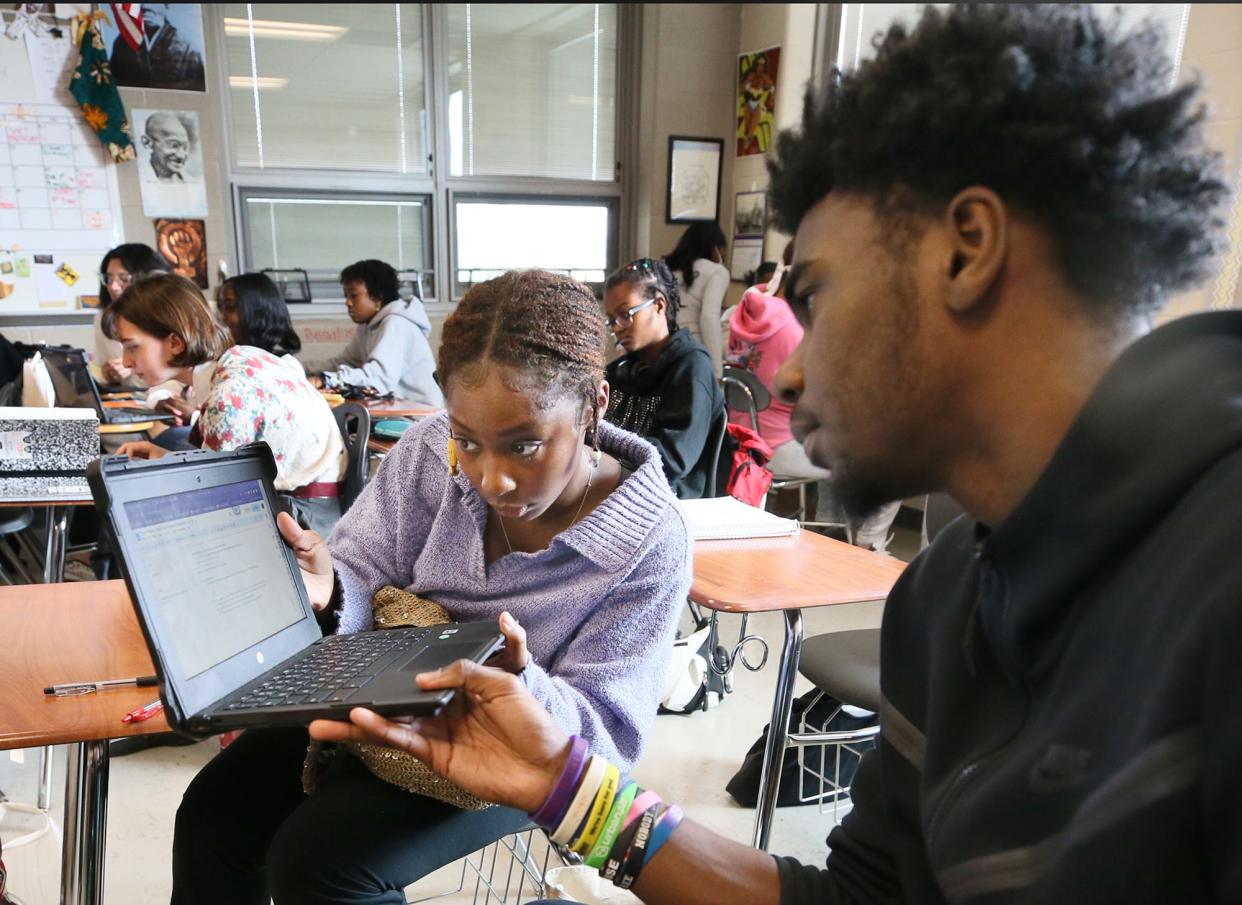
The tiny dots dart across the screen from right to left, at first a slow trickle, then a deluge.
Each dot, representing one ship full of enslaved human beings, moves east to west on the map, crossing the Atlantic from Africa to the Americas. The dots are different colors, each representing the country that owns the ship. The bigger the dot, the more people are on board.
The time lapse starts in the year 1515 with one ship. By the 1800s, dots are pouring out of all sides of Africa.
"This isn't one big massive thing that happens all at once," Firestone Community Learning Center teacher Erin Irwin Saal says as the dots fly across the screen at the front of her classroom. "It's a gradual growth."
"I'm trying to figure out when it's going to stop," senior Johnathan White comments.
"This is why we live here," says his classmate Dariyah Adams, who, like Johnathan, is Black.
Those are the exact kinds of connections that Saal wants her students to make in this class.
This is Advanced Placement African American Studies in Akron Public Schools.
What is AP African American Studies and why is it controversial?
The course is new for Akron and the country. This is the second school year College Board — a national nonprofit that creates AP classes that high school students can take for college credit — is piloting AP African American Studies.
The first year, only 60 schools across the country were part of the pilot. This year, the number has grown to a couple hundred, but only 18 high schools in Ohio are offering it.
Akron is the only district in Summit County that is part of the pilot, offering it at two high schools: Firestone and Buchtel community learning centers.
The launch of the class spurred national controversy, as Florida called for a ban on the course. Other states' leaders followed and labeled it as "indoctrination."
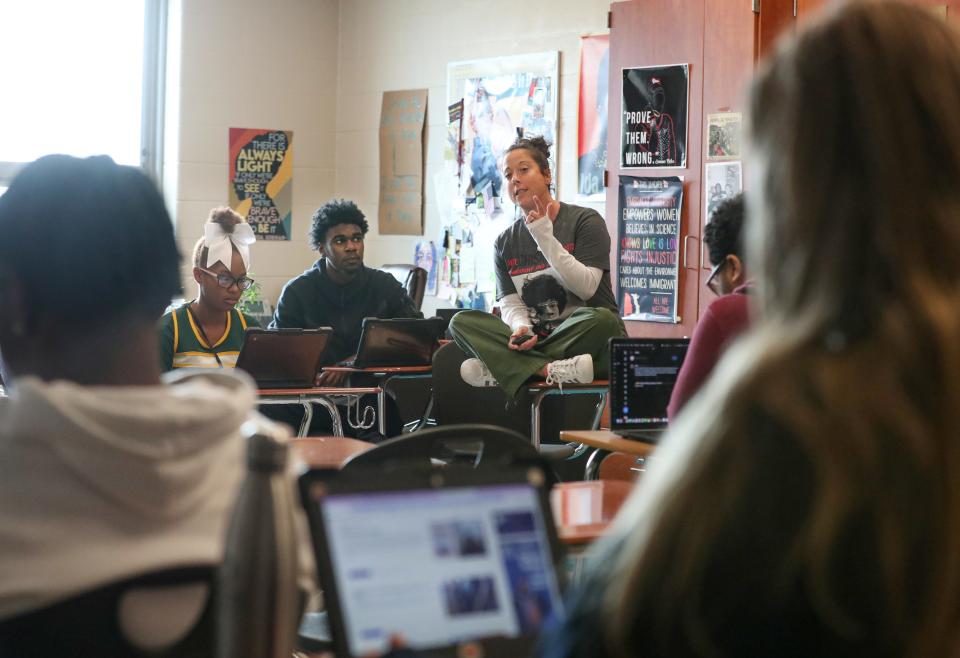
When some of the topics and names that Florida's Republican governor, Ron DeSantis, had problems with were omitted from the curriculum, critics accused College Board of capitulating to politics. The organization then said it would revisit the omission of those topics and names, including author Ta-Nehisi Coates, activist Angela Davis and the concept of intersectionality, the idea that people's identities can overlap and compound their oppression.
"We are committed to providing an unflinching encounter with the facts and evidence of African American history and culture," the organization said in a statement at the time.
Adam Motter, Akron's learning specialist for social studies, said the district would be honored to continue with the course, which has one more year in the pilot before it is available to be offered anywhere in the country.
Motter said the district is "satisfied" and "comfortable" with the curriculum, even after College Board's back-and-forth response to political pressures. But, he noted, it is still a pilot and may go through some tweaks.
"What we do know is this is an absolutely fantastic opportunity for students that want to take this elective course," Motter said. "We are doing this to help support our Akron scholars, and we're thrilled about it."
Akron and the 10 other districts that are offering the course, including districts in Columbus, Cincinnati, Cleveland and Toledo, are doing so at a time that the Ohio legislature is considering a complete rewrite of Ohio's social studies standards to focus on Western history, American exceptionalism, patriotism and Christianity over civic engagement. Critics say it would provide Ohio's students with a white-washed version of history.
"The duties of a public education system is to prepare the student for their future," said Sheena Barnes, Toledo Public Schools Board of Education president. "And that future is very diverse."
Barnes, who is also a core team member for Honesty for Ohio Education, a non-partisan group that opposes the attempts to rewrite Ohio's social studies standards, said nothing taught in the AP African American Studies course or in any social studies class is designed to make anyone feel guilty, a concern raised frequently by conservatives.
"History is not a guilt trip," she said. "History is facts."
Meanwhile, kids in Akron classrooms are just wanting to learn history — in many cases, their own.
'Akron's not Florida'
Saal's classroom is packed with desks split into two groups that face each other from opposite sides of the room. One section of the AP African American Studies class has 24 students, and the other has 31.
With her larger group on a recent Monday morning, Saal starts the 90-minute class period with each student doing about five minutes of individual work, perusing a National Public Radio podcast called "Code Switch" and picking out one that interests them to listen to later. Several students gravitate toward one called "What makes a good race joke?"
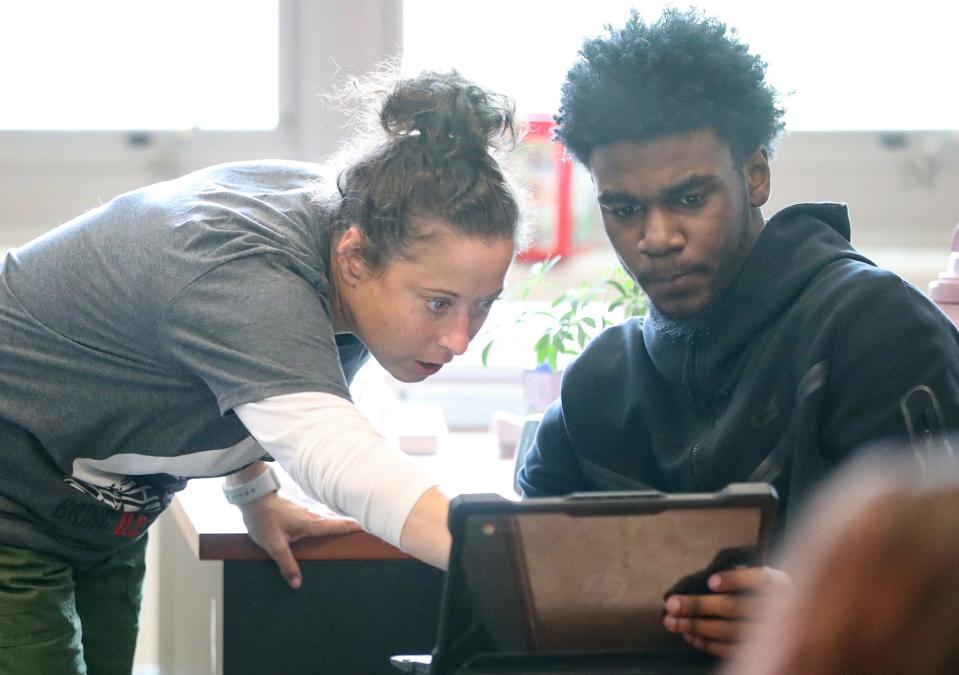
The students are at the beginning of the second of four units in the year-long course. They've already gone through "Origins of the African Diaspora" and are just getting into "Freedom, Enslavement and Resistance." They will later tackle "The Practice of Freedom" and "Movements and Debates."
The unit that covers slavery is tough, Saal warns her students.
To understand what enslaved people endured before they even left Africa, the students learn the term "coffles," a group of slaves who were chained together and moved together.
"In many cases, and this is where we're getting into just the harsh reality of the situation we're dealing with, they would be chained by their necks and then chained to the person in front of them and chained to the person in front of them," Saal explains.
Saal, a veteran teacher and a Firestone graduate, encourages questions in her class and is honest with her students when she doesn't know the answer.
The walls of her classroom are plastered with posters highlighting Black leaders, including Jesse Jackson and Malcolm X, and other leaders of color, like Malala Yousafzai.
Through the duration of the lecture portion of the class, Saal is constantly asking questions for the students to answer, sometimes individually and sometimes as a group.
She walks them through the curriculum as it is written by College Board, highlighting the intricate dynamics of the origins of slavery, not just as it impacted the United States but how it impacted Africa as well.
They discuss the differences between slavery in the Americas and in Africa, with students giving input on how slavery in Africa was used more as a punishment, while in the Americas, it was race-based.
"African traders acquired slaves through a large network that extended through much of western and west central Africa," Saal says. "But again, and I can't highlight this enough, we are not going to make the argument that Africans were responsible for the race-based slavery in the Americas."
After about half an hour of note-taking and discussion, Saal shows her class the time-lapse of the Transatlantic Slave Trade. She plays it on the screen, then gives the students time to play with it themselves on their Chromebooks and answer a list of questions about what they learn from it. The course is rooted in analyzing primary sources like newspaper articles, journals and databases, and secondary sources like scholarly articles or documentaries.
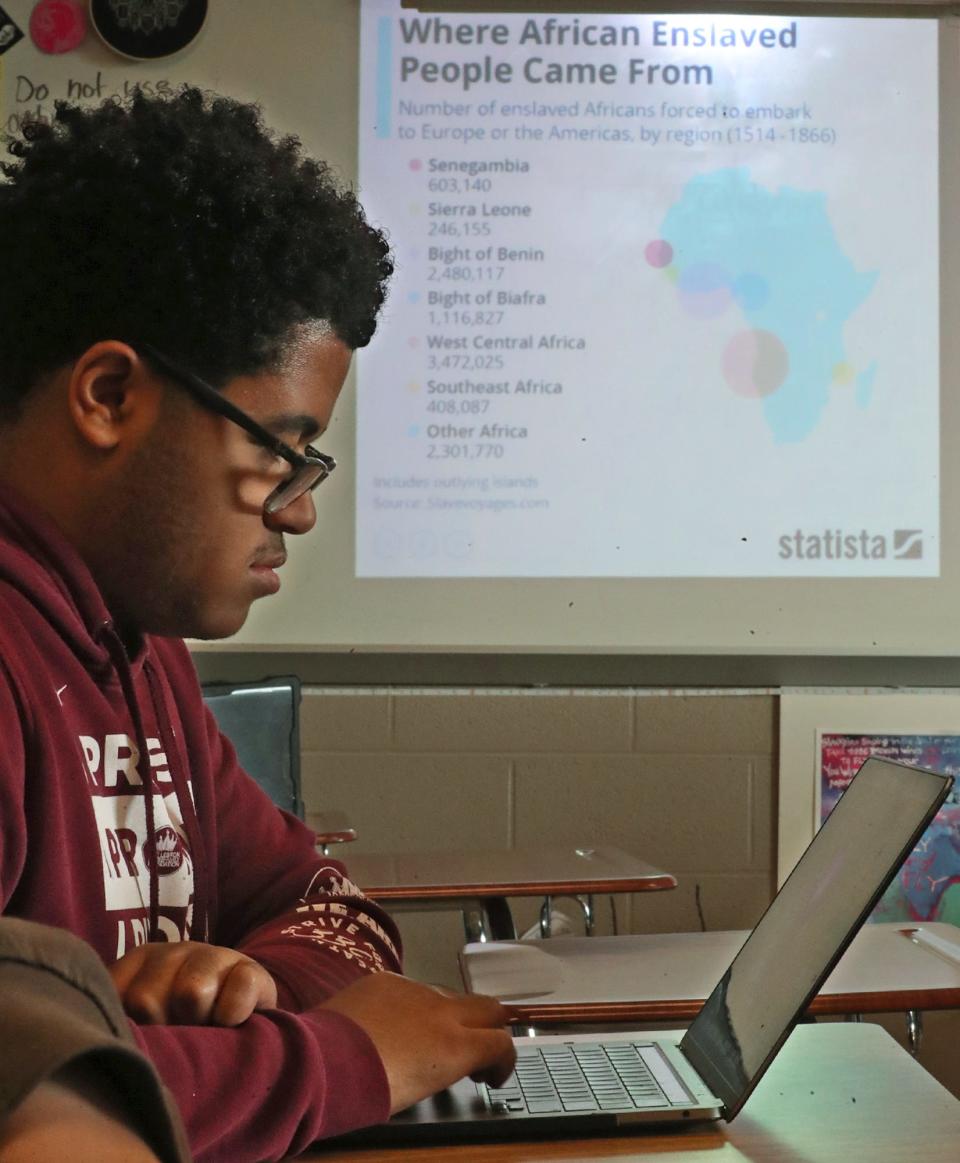
Saal said in an interview she had previously taught an elective course on African American history, so when she was approached about teaching the AP course, she jumped at the chance. She called the course "fantastic and necessary."
"Kids have complained that all they ever learned about was the exact same things over and over since they were in elementary school," she said.
They have talked about the controversy in Florida and other places that had called for the course to be banned.
"Well, Akron's not Florida, so we get to do it, and we’re really excited," Saal said. "We just pushed right through it. We acknowledged that maybe their counterparts in other states aren’t having this opportunity, and we were thankful that we did."
'A connection there that I never really thought about'
Senior India Wray had a light-bulb moment in class at the beginning of the unit that covers slavery.
The first stop for many slaves in America, she learned, was Charleston, South Carolina. India's mom and grandmother are from Charleston.
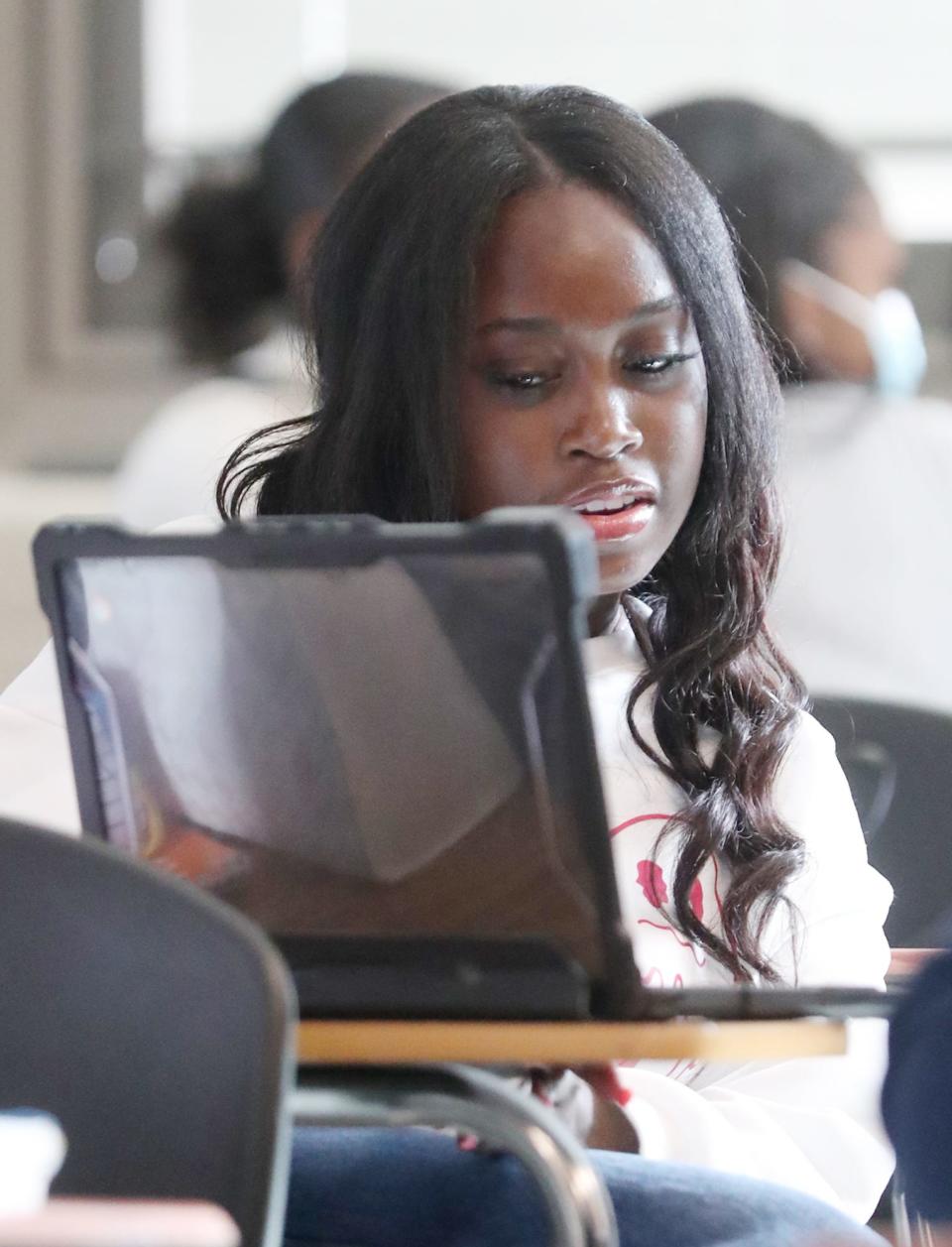
"That's a connection there that I never really thought about that I could probably look into," she said.
About three-quarters of the students in the Firestone AP class are Black. Several of them said they are finally seeing themselves and their own history as part of what they are learning about in school — not just the negative aspects, but also the positive leaders, the inventors, the traditions, and the successes of Africans and African Americans.
"This class gives us people who have done it, and people who have paved the way for us to do it, and gives us role models," senior Nyjah Watson said.
India said that's having real impact.
"I feel like this class is shaping us to be the role models for the underclassmen," she said.
Johnathan said it's helping him understand more about his culture today. He shared the example of how many Black people refer to each other as cousins, aunts or uncles when they aren't blood related. That's a direct result of kinships, groupings of people who all raised their children together, in African tribes.
"I never knew that until (Saal) told us," Johnathan said. "So it's learning things that we say in our everyday life or do in our normal life that we didn't know originated from African tribes."
The students said they love taking the class from Saal.
Dariyah Adams said she was skeptical at first.
"I was like, a white teacher? A white teacher teaching Black, African American history? That was my side-eye at first," Dariyah said. "But like, once I got into the class, I'm like, 'OK, I trust Saal.'"
"She's always been upfront when she says she doesn't know what the Black experience is, but she can teach us," Nyjah said.
They appreciate that Saal also brings in guest teachers who are Black, including an assistant principal who asked Saal if she could teach a class on the slave trade because it was an area of expertise for her. Dariyah was there for Saal's response.
"Saal was like 'Oh, absolutely,'" Dariyah said. "She could have jumped in her arms."
Dariyah said she hoped more white students would take the class and understand it was important for them to learn the history as well, not just Black students. An AP European History class, she said, had many more white students in it.
"We've been learning European history since kindergarten," she said. "You already know this stuff."
The students brought up the controversy about the course in Florida and other states.
"I think the banning of this class in Florida is the exact reason why they need to have this class," Nyjah said. "Because they're just not informed on it."
'This is the class that I talk about most'
When Alaina Tennant signed up for AP African American Studies, her mom asked her how many other white people she thought would be in the class.
Alaina told her she thought at least half the class would be white, as Firestone is fairly racially balanced. She walked in on the first day and saw only two other white students.
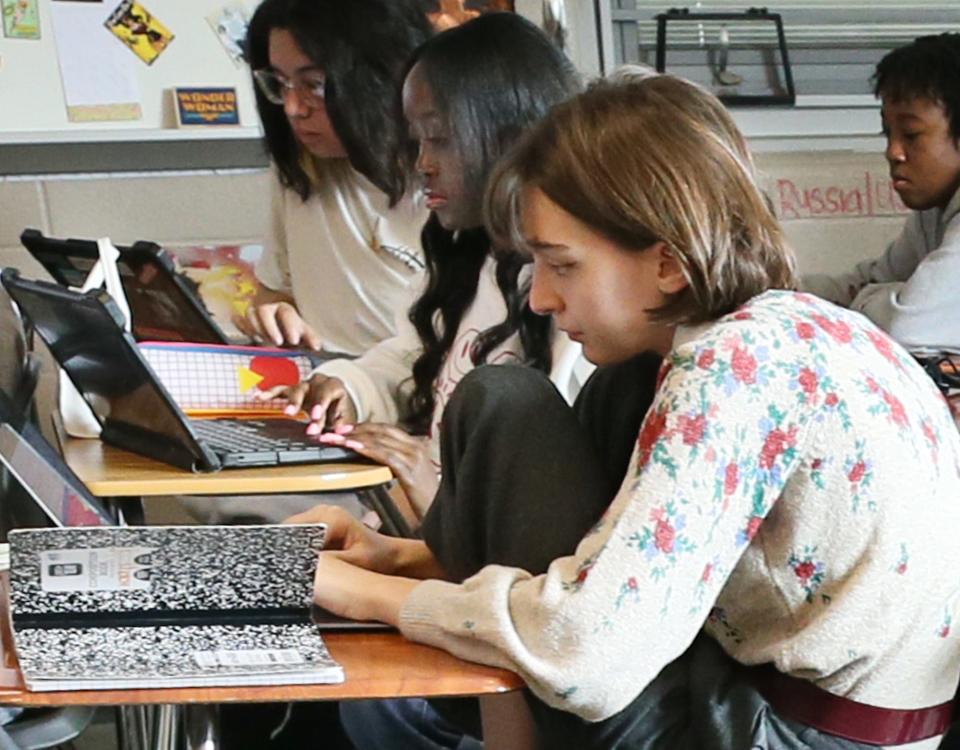
"I remember first of all texting my mom and being like, 'You were right,' and second of all, being like, 'That’s kind of disappointing,'" Alaina said. "Like, all of the white people in the school chose to take AP European? I know they're not interested in European history."
Alaina transferred to Akron Public Schools from a more rural suburban district that is almost entirely white.
"I have never talked about Africa in any of my history classes, even world history," she said.
She said she believed AP African American Studies would never be taught there, and she jumped at the opportunity to take it in Akron. Transferring into the racially diverse school was a lesson in itself, she said.
"When I moved to this school district, I didn’t know how to, like, interact with people," Alaina said. "There was just so much that I hadn't learned because I hadn't learned any of the history. I didn't know what was inappropriate to say. It was a learning curve for me. I think that's kind of the reason I took the class as well. Because if I learn so much just existing around people who aren't white, there's stuff I can learn from the history [of] people who aren't white."
Alaina said she loves that the class is more than learning historical facts. It's learning stories about people.
"I go home and I think this is the class that I talk about most out of all my classes," she said.
'A history that's been deprived of them for far too long'
At Buchtel, a smaller group of students is taking the class.
Adding a new AP class is a big deal for Buchtel, which historically has offered fewer than some other Akron high schools. This year, Buchtel has just five AP classes. Firestone offers 12.
The AP African American Studies class at Buchtel is taught by Peter Viola, who is now in his 29th year of teaching social studies classes.
Viola said he was excited about the chance to teach this class, especially at a school like Buchtel that has predominantly Black students. All the students in his class are Black.
"I was honored to have the opportunity to teach it, especially in a place like Buchtel, because it can help connect them to a history that's been deprived of them for far too long," Viola said.
The group is small, fewer than a dozen students, and most are new to AP-level work, he said. But they have come into it with open minds.
"They’ll be able to look back and say, 'I now have a much better understanding of who my people are,'" Viola said. "There's definitely a disconnect for most young African American students whose history has, in the past, not been available to them."
As they are still finding their footing, the students declined to have a reporter and photographer observe a class period. But two students in the group said they are excited for the opportunity to take the class and are already learning more than they knew before about the history of people who look like them.
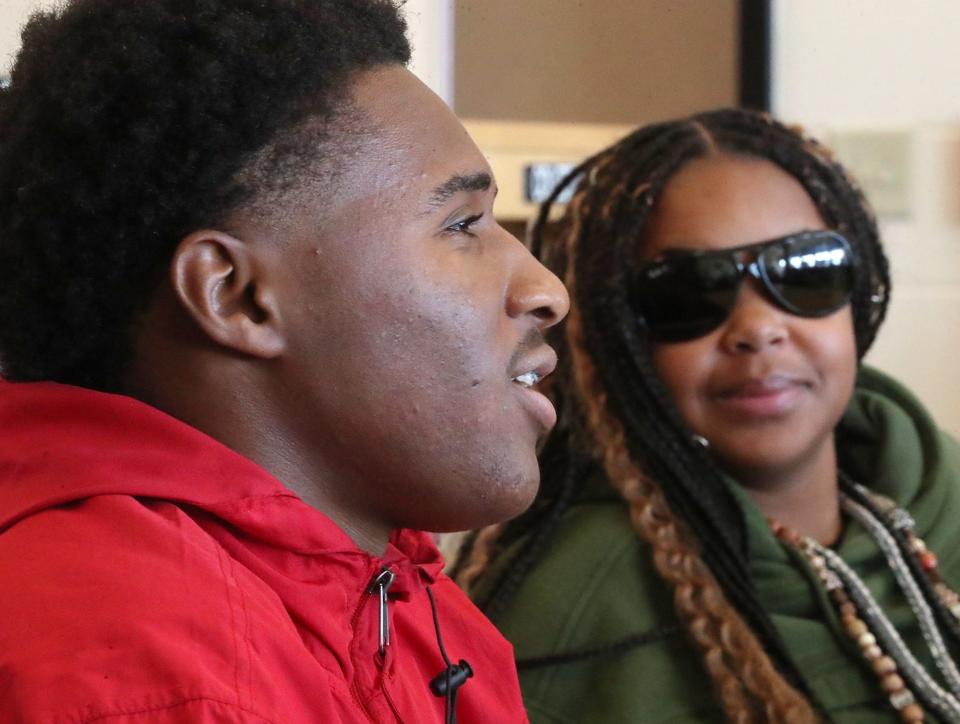
"We don't really know much about our history besides the stuff they tell us, the simple stuff that everyone knows about, like Martin Luther King Jr., Rosa Parks," senior Demetrion Duvall said. He was impressed to know the first documented person of African descent to set foot in the Americas was a free man, Juan Garrido.
"It was cool," he said. "It was new — something I'd never heard of before."
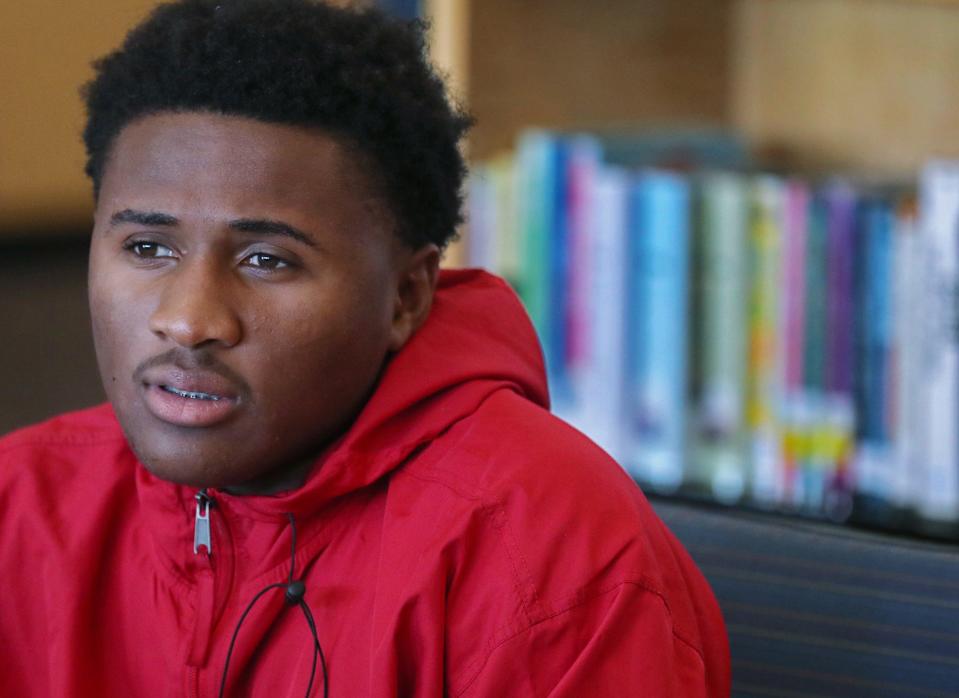
Junior Johniyah Battle said she never had an appreciation for just how big Africa is, and that the United States could fit into Africa three times.
Johniyah said she wasn't sure the class was for her and was especially skeptical because Viola is white.
"I still am, because it's like, you can't teach it from experience," she said. "It's a secondary source. He's not a primary source. So that's a huge difference. That's a concern."
Still, Viola "teaches it well," Johniyah said. "He points [out] stuff that's important to know, he makes sure not to say stereotypical things and [says] factual stuff."
They both said they hope more students will take the class, and not just Black students, so more African American history is known.
"Our history is very stereotypical," Johniyah said. "Everybody was a slave, everybody was poor. It's so much more."
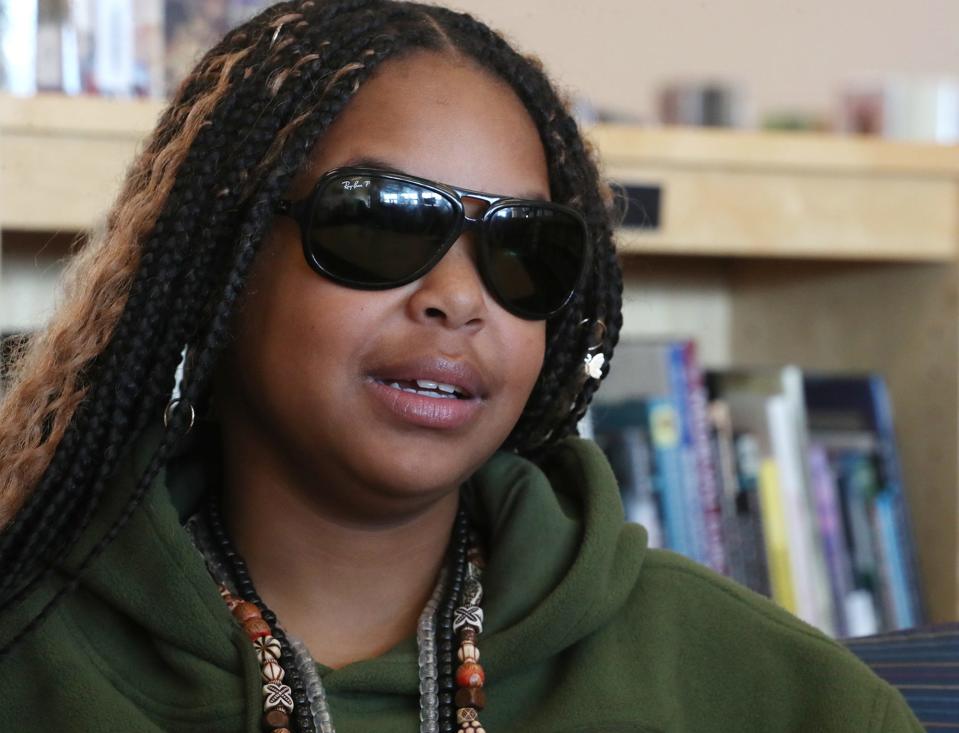
They said they felt like it could help tackle stereotypes they encounter in their everyday lives — from Demetrion, who said people never think he's the kicker on the football team, to Johniyah, who wears sunglasses even indoors as part of her look just because she feels like it and gets called "trouble" or "suspicious."
She said Viola told them at the beginning about the controversy of the class.
"I feel like why wouldn't you want to teach our history?" Johniyah said. "Every other history is taught [regularly], like world history, all those other types of history, but our history, there's a problem to teach? I don't understand that."
Contact education reporter Jennifer Pignolet at jpignolet@thebeaconjournal.com, at 330-996-3216 or on Twitter @JenPignolet.
This article originally appeared on Akron Beacon Journal: 2 Akron schools offering AP African American Studies course

